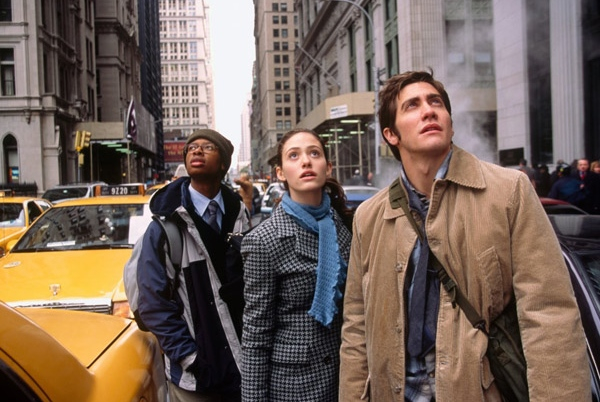Movie review by Greg Carlson
“The Day After Tomorrow,” a stupendously awful disaster flick in the tradition of “Earthquake” and “The Towering Inferno,” is an absolute howler. Writer-director Roland Emmerich continues to build his dodgy resume (“The Patriot,” “Godzilla,” “Independence Day”) with another computer effects-driven spectacle; the only difference this time is that he weirdly seems to embrace perpetually maligned eco-philes as his noble protagonists. While global warming leads to tidal waves, floods, hurricanes, and the dawn of a new ice age (seemingly thrown in for good measure), insensitive politicos are initially painted as the shortsighted bogeymen whose disregard for the environment has led to meteorological Armageddon.
Climatologist Jack Hall (Dennis Quaid, jaw clenched tightly) barks his way through the hysterical screenplay’s finest lines. After suggesting that the North Atlantic has hit “a critical desalinization point” Hall springs into action – which amounts to spending lots of time on the phone with other weather gurus like Terry Rapson (Ian Holm), in order to corroborate the grim calculations that just don’t seem to matter that much when the whole world is under siege from extreme weather conditions. The Capitol Records building and the Hollywood sign are vaporized by twisters, New Delhi is hit with a blizzard, Tokyo is buried under giant chunks of hail, and New York is drenched by a wall of water that almost instantly freezes into a sheet of ice.
While the special effects are generally impressive, the catastrophic conditions are never once rendered plausibly. Victims are rarely shown, and the survivors are almost unfailingly polite to each other. The cool detachment, which some have suggested exists as a kind of antidote to post 9/11 skittishness about showing large-scale urban chaos, robs the movie entirely of its ability to inspire awe or fright. The perpetual irony of the disaster movie genre is that we know instinctively that the underlying theme is going to be one of survival and not destruction. No matter how devastating the calamity, most of the core group of central characters will make it through to the end, ready to start anew.
Just as the emergency reaches fever pitch, Hall’s son Sam (Jake Gyllenhaal, smirking) finds himself trapped in Manhattan with the other members of his competitive academics squad. He admits joining the team because he has a wicked crush on hot brainiac Laura (Emmy Rossum), and sure enough, the movie makes sure that the pair has to save their lives by “sharing body heat” (see also: “The Saint” with Val Kilmer and Elisabeth Shue, and nearly every daytime soap opera ever made). Resourceful Sam holes up with a handful of other stock characters (mousy librarian, snobbish intellectual, streetwise homeless guy, etc.) in the public library, which provides plenty of opportunity to make jokes related to the burning of books for warmth.
Jack eventually decides that it would be a swell idea to set out on foot to rescue his son, and the movie chucks the last of its skimpy plausibility out the window. By this point, it is best to simply give up on the goofball movie science that governs the action (temps dropping at ten degrees per second, for example), and the wacky inclusion of select sequences tossed in for their “look what we can do!” factor (watch out for those wolves!). Instead, enjoy the tiny number of comic bits that were actually intended to be funny: the vacant president nervously asking the Dick Cheney-esque veep “What do you think we should do?” and the shots of Americans wading the Rio Grande into Mexico. In the end, the movie is never particularly entertaining, which suggests that one should just wait and see it the day after tomorrow.
